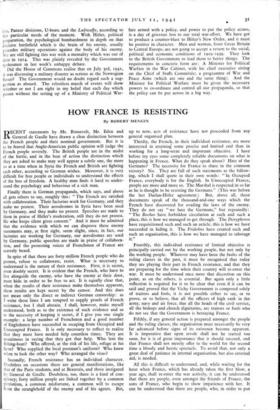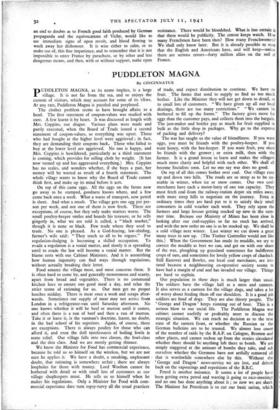HOW FRANCE IS RESISTING
By ROBERT MENGIN
RDECENT statements by. Mr. Roosevelt, Mr. Eden and General de Gaulle have drawn a clear distinction between the French people and their nominal government. But it is to be feared that Anglo-American public opinion will judge the French people severely. The British people are in the midst of the battle, and in the heat of action the distinction which they are asked to make may well appear a subtle one, the more so at a time when in Syria the French and British are fighting each other, according to German wishes. Moreover, it is very difficult for free people or individuals to understand the effects of the loss of freedom. A healthy man finds it hard to under- stand the psychology and behaviour of a sick man.
Finally there is German propaganda, which says, and above all gets others to say, roughly this: "The French are satisfied with collaboration. Their factories work for Germany, and they make no protest. Their aerodromes in Syria have been used by Germany, and they make no protest. Speeches are made to them in praise of Hitler's moderation, still they do not protest. He who keeps silent gives consent." And it must be admitted that the evidence with which we can disprove these enemy statements may, at first sight, seem slight, since, in fact, our factories are working for Germany, our aerodromes are used by Germany, public speeches are made in praise of collabora- tion, and the protesting voices of Frenchmen of France are scarcely heard.
In spite of that there are forty million French people who do protest, refuse to collaborate, resist. What is necessary to understand is the nature of their resistance. First, it is secret, even doubly secret. It is evident that the French, who have to live alongside the enemy, who have the enemy at their door, must hide in order to be free to act. It is equally clear that, when the results of their resistance make themselves apparent, these results are kept secret by the censor. And this does not mean only the direct or indirect German censorship: as I write these lines I am tempted to supply proofs of French resistance, but I shall abstain. I shall, however, make myself understood, both as to the existence of such evidence and as to the necessity of keeping it secret, if I give you one single example: a large number of Frenchmen and a good number of Englishmen have succeeded in escaping from Occupied and Unoccupied France. It is only necessary to reflect to realise that they must have needed help countless times. They are unanimous in saying that they got that help. Who lent the fishing-boat? Who offered, at the risk of his life, refuge at his farm? Who supplied the local postman's uniform? Who knew when to look the other way? Who arranged the visas?
Secondly; French resistance has an individual character. Doubtless on occasions there are general manifestations, like that of the Paris students, and at Beauvais, and those instigated by General de Gaulle. Doubtless, too, there is a kind of con- spiracy; forty million people are linked together by a common patriotism, a common misfortune, a common will to escape from the stranglehold of the enemy and of his agents. But, up to now, acts of resistance have not proceeded from any general organised plan.
Thirdly, the French, in their individual resistance, are more interested in attaining some precise and limited end than in working for a long-term and important objective. I have before my eyes some completely reliable documents on what is happening in France. What do they speak about? Hate of the Germans? The necessity for France to share in the common victory? No. They are full of such statements as the follow- ing, which I shall quote in their own words: "In Occupied France, everybody is for the English. In Unoccupied France, people are more and more so. The Marshal is respected in so far as he is thought to be resisting the Germans." (This was before the last Darlan-Hitler agreement.) But, above all, these documents speak of the thousand-and-one ways which the French have discovered for evading the laws of the enemy. They do not say "we hate the Germans," but repeatedly: "The Boches have forbidden circulation at such and such a place, this is how we managed to get through. The Doryphores have requisitioned such and such an article, this is how we have succeeded in hiding it. The Fridolins have created such and such an organisation, this is how we have managed to sabotage it."
Fourthly, this individual resistance of limited objective is principally carried out by the working people, but not only by the working people. Whatever may have been the faults of the ruling classes in the past, it must be recognised that today they are playing their part in French resistance, and that they are preparing for the time when their country will re-enter the war. It must be understood once more that discretion on this point, as on the others, is essential. But again only a little reflection is required for it to be clear that even if it can be said and proved that the Vichy Government is composed solely of traitors and fools, it is not possible either to say, or to prove, or to believe, that all the officers of high rank in the army, navy and air force, that all the heads of the civil service, all the bishops and church dignitaries, are traitors or fools who do not see that the Government is betraying France.
Fifthly, if any general action is prepared amongst the people and the ruling classes, the organisation must necessarily be very far advanced before signs of its existence become apparent. It is imperative that open revolt shall not be started too soon, for it is of great importance that it should succeed, and that France shall not merely offer to the world for the second time a bloody and heroic spectacle. To avoid that, not only a great deal of patience in internal organisation, but also external aid, is needed.
All this is difficult to understand, and, while waiting for the hour when France, which has already taken the first blow, a year ago, shall re-enter the war actively, it can be understood that there are people, even amongst the friends of France, the sons of France, who begin to show impatience with her. It can be understood that there are people, who, in order to put an end to doubts as to French good faith produced by German propaganda and the equivocations of Vichy, would like to see immediate signs of open revolt, and blood flowing to wash away her dishonour. It is wise either to calm, or to make use of, this fine impatience, and to remember that it is not impossible to enter France by parachute, or by other and less dangerous means, and then, with or without support, make open resistance. There would be bloodshed. What is less certain that there would be publicity. The censor keeps watch. How many Frenchmen .have been shot? How many Frenchwomen? We shall only know later. But it is already possible to state that the English and Americans have, and will keep—unless there are serious errors--4orry million allies on the soil of France.



























 Previous page
Previous page